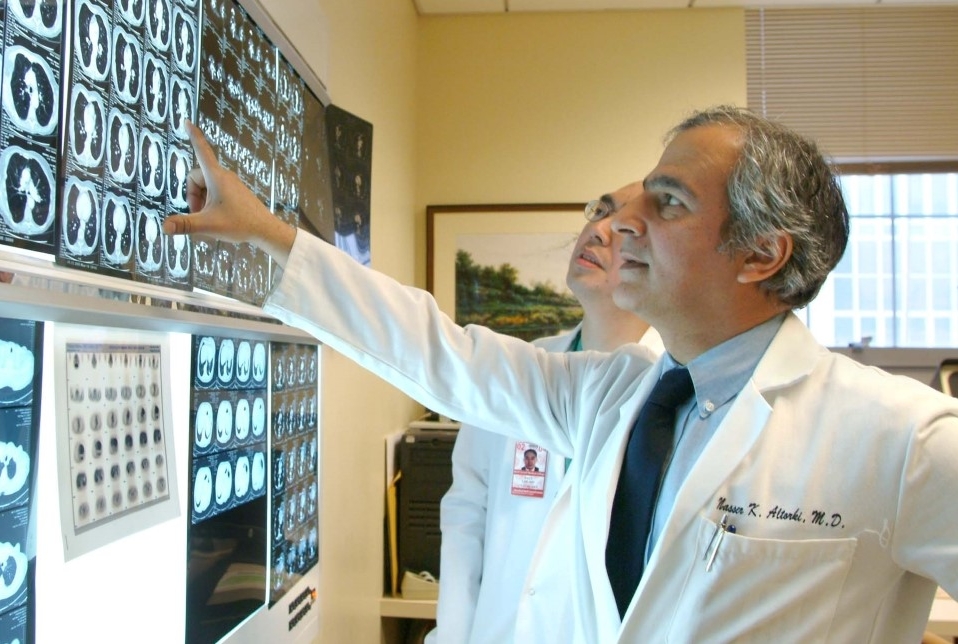
A new study reported that patients with non-small cell lung cancer (NSCLC) treated with a combination of low-dose radiation and immunotherapy had higher progression-free survival compared to patients who received immunotherapy alone two years after treatment. The findings from researchers at Weill Cornell Medicine, NewYork-Presbyterian and Columbia University Vagelos College of Physicians and Surgeons offer hope to those affected by NSCLC, the most common type of lung cancer in the United States—81 percent of all lung cancer diagnoses.
Chemotherapy is frequently coupled with immunotherapy for treating people with lung cancer, but this study, published in Nature Communications on Dec. 19, suggests another option. “The addition of low-dose radiation with immunotherapy could increase the options available to patients, particularly those who can't tolerate chemotherapy,” said Dr. Nasser Altorki, chief of the Division of Thoracic Surgery at Weill Cornell Medicine and NewYork-Presbyterian/Weill Cornell Medical Center and the paper’s lead author.
Dr. Zachary Walsh, MD/PhD candidate at Columbia University Vagelos College of Physicians and Surgeons, was also co-first author on this study.
Dual Treatment Eradicates Tumor Cells
Previously, an investigator-initiated clinical trial at NewYork-Presbyterian/Weill Cornell Medical Center conducted by Dr. Altorki and colleagues enrolled 60 patients with early-stage NSCLC. The randomized phase 2 trial, sponsored by AstraZeneca, coupled radiation with durvalumab, an immune-boosting “checkpoint inhibitor.” These drugs work by releasing the brakes on the immune system to induce a response against tumor cells, but their effects may be insufficient to fully eliminate the cancer.
“Using a low dose of radiation to enhance the immune response, rather than a high dose to destroy the tumor, was a novel feature of the trial,” said co-senior author Dr. Timothy McGraw, professor of biochemistry at Weill Cornell Medicine. “From that perspective, I believe Dr. Altorki’s trial design remains unique.”
Dr. Benjamin Izar, assistant professor of medicine at Columbia University Vagelos College of Physicians and Surgeons and medical oncologist at NewYork-Presybeterian/Columbia University Irving Medical Center, was also co-senior author on the paper.
The initial findings, published in Lancet Oncology in 2021, demonstrated that the combo treatment eradicated significantly more tumors than immunotherapy alone. In fact, the combination invoked a “major pathological response”—one that kills more than 90% of the cells in the tumors that were surgically removed and analyzed during the course of the study.
But would it also improve patient survival? To find out, the researchers continued to follow the cohort for an additional two years.
Cancer-free survival correlates with activated immune response
The results of the extended study indicated that the dual therapy reduced the chances of cancer recurrence and extended progression-free survival. Six of the individuals who received immunotherapy alone died of cancer. However, in the “dual-therapy arm” of the trial, there was only one death from cancer and five deaths unrelated to cancer recurrence.
The team also found that cancer-free survival is accompanied by heightened immune activity. Individuals who received immunotherapy plus radiation and had major pathology responses had more activated T cells in their blood compared to those who did not have a major pathology response. “The appearance of these activated T cells was associated with freedom from cancer recurrence,” said Dr. Altorki, who is also the David B. Skinner, M.D. Professor of Thoracic Surgery and the leader of the Experimental Therapeutics Program in the Sandra and Edward Meyer Cancer Center at Weill Cornell Medicine.
The researchers discovered that participants who mounted a major pathological response harbored tissue-resident T cells in their blood—even before treatment had begun. “You wouldn’t normally expect to find these cells in circulation,” said Dr. Altorki. Their presence suggested that, in these individuals, the immune system had already detected the tumor and initiated a response. Examining participants’ T-cell repertoire could potentially identify individuals who would benefit from combination treatment.
The researchers intend to follow up on this observation in an upcoming trial to assess how radiation stacks up against chemotherapy as a means of bolstering immunotherapy. “We’ve shown that radiation works,” said Dr. Altorki. “But does it work as well as—or even better than—chemotherapy? That’s what we want to answer now.”
Many Weill Cornell Medicine physicians and scientists maintain relationships and collaborate with external organizations to foster scientific innovation and provide expert guidance. The institution makes these disclosures public to ensure transparency. For this information, please see the profile for Dr. Nasser Altorki.

